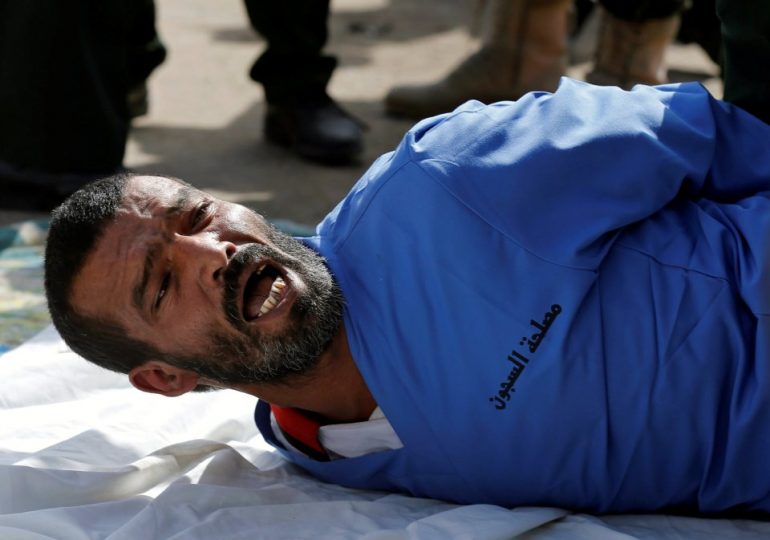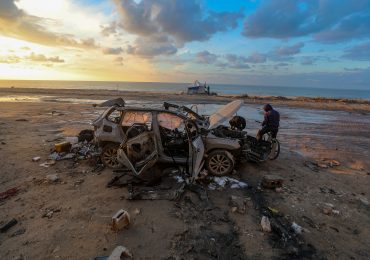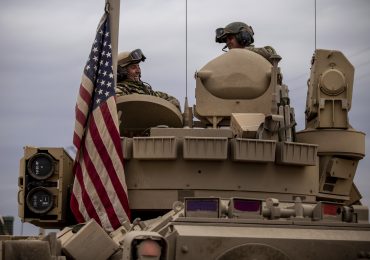LIFE in Yemen is brutal and has become increasingly more so since Hamas launched its murderous rampage through Israel in October.
Firing squad executions and public floggings are now on the rise in the conflict-torn country – and no one, not even civilians, is safe.
ReutersMuhammad al-Maghrabi reacts as he is prepared to be executed in Sanaa after being convicted of raping and murdering a three-year-old girl[/caption]
ReutersChildren attend a weekly rally organised by the Houthis called ‘We Are With Gaza Until Victory’ in Sanaa[/caption]
AFPA member of the Yemeni security forces executes one of nine men convicted of being involved in the killing of a Houthi leader[/caption]
Houthi rebels, who emerged in northern Yemen in the 1990s and have been fighting the government since 2004, took over Yemen’s capital Sanaa in 2014 and much of the north by 2016.
With access to Yemen’s military hardware – including missiles, tanks, and air assets – and the support of Iran, the Houthis have only continued to grow in power and size over the years.
The rebel group considers Israel an enemy and made a point of pledging its allegiance with Hamas in November when it imposed a shipping blockade on the Red Sea.
It recently vowed to continue attacking ships in the region after a series of US and UK strikes on Houthi bases.
But the rebels are also ramping up their violence against ordinary Yemeni civilians, from human rights activists to media officials and fishermen, in an ongoing ISIS-style reign of terror.
A Yemen researcher from Human Rights Watch, Niku Jafarnia, said the Houthis were using their attacks in the Red Sea to distract the world from its “rights abuses” at home.
Such abuses, which include public torture and executions, have been on the rise since the Red Sea attacks.
Ms Jafarnia told The Telegraph: “While the Houthis are busy promoting an image to the world that they are defending Palestinians in Gaza against Israel’s atrocities, they are silencing Yemenis who dare to criticise them.”
A Yemeni Army media spokesperson, Rashid Maarouf, made a similar claim, stating: “Many of the death sentences were issued after the war on Gaza.
“We are all seriously considering leaving Yemen to live abroad. There is no safety inside the country. The Houthis have great influence … We are all at risk.”
Just two weeks ago, human rights activist Fatima Al-Arouli was sentenced to death over allegations of spying for the United Arab Emirates, which has been part of a Saudi-led coalition against the Houthis for nearly a decade.
Both Saudi Arabia and the UAE tried to restore Yemen’s government in 2015, but the violent conflict has dragged on, killing tens of thousands and leaving millions dependent on humanitarian aid.
The Houthis continue to hold massive military parades, showing off their ballistic missiles and armed drones in a chilling warning to foreign forces “to leave or … face the volcanoes of Yemeni anger”.
It is believed Fatima was arrested two years ago, upon her return from Dubai, and will face execution within a matter of days.
She is just one of many Yemeni civilians set to be executed.
Fifteen-year-old Khaled Ateeq Saleh Al-Awadi was first captured by the Houthis two years ago, and his desperate mum has been begging for him to be released and returned to her ever since.
Mr Maarouf explained: “The child’s mother has been pleading with the Houthi leadership to release her only son.
“She has no [other] children.”
He continued: “The militias have assassinated many media activists.
“I was exposed to many threats and assassination attempts, and I was forced to travel to the border with Saudi Arabia to work here in a military area that is considered safer than the interior.”
ReutersPolice officers escort Muhammad al-Maghrabi, convicted of raping and murdering a young girl, to the execution site in Sanaa[/caption]
AFPYemeni security forces stand next to the body of a man who was executed after being convicted of killing his three daughters[/caption]
ReutersA boy looks on while attending a parade for new Houthi recruits[/caption]
Houthi chief Mohammed Al Houthi’s recent takeover of Yemen’s judiciary is said to be behind the recent uptake in executions, as it gave his movement the power to “expedite” sentences.
People can now be given execution orders within days, where it previously took as long as two years.
Back in 2021, the rebels executed nine people – including a 17-year-old boy – who they said were spying for the Saudi-led coalition and were involved in the killing of a senior rebel official three years prior.
Hundreds of people, mostly Houthis and their backers, attended the execution, which took place by firing squad in Sanaa.
But the first public execution to take place in Yemen for more than a decade was in August 2017, when a Yemeni man was shot in front of a crowd after being convicted of raping and killing a three-year-old girl.
Following the judiciary takeover, the rebels now also have the power to take the properties and assets of anyone who they do not like.
Yemeni human rights activists have claimed fishermen are also being targeted and killed by the Houthis – for defying their ban on fishing.
There is no safety inside the country. The Houthis have great influence … We are all at risk
Rashid Maarouf
Eight fishermen from Al-Khawkhah District reportedly disappeared a month ago and are yet to be found, while the bodies of two other fishermen were last week found with gunshot wounds, decomposed to such an extent that they could not be identified.
The fishing ban itself – which involves a complete prohibition of fishing and the elimination of all fishing boats in the sea – is predicted to exacerbate civilians’ starvation levels and leave countless families without a source of income.
Last month, harrowing pictures showing gun-toting children in a crowd surfaced as thousands took to the streets in Yemen to protest airstrikes launched by the UK and US.
Houthi supporters flocked to the streets of Sanaa, chanting “America is the devil”, following overnight blitzes.
The US has not ruled out launching direct strikes on Iran after a series of American attacks in the Middle East.
White House National security adviser Jake Sullivan said the US’ retaliatory strikes at the weekend, which came after the killing of three American troops in a drone strike by Iran-backed forces, were “not the end” of US action in the region.
Meanwhile, in a disturbing warning to American forces, Tehran on Sunday told America to leave Iranian spy ships in the Red Sea alone.
The US and UK targeted Houthis in Yemen on Saturday night and struck 36 targets in 13 different locations, according to the Pentagon.
A military parade held by the Houthis marked the anniversary of their takeover in Sanaa, Yemen in September last year
GettyYemen’s Houthi weaponised followers take part in a parade denouncing the US-led aerial attacks on Yemen[/caption]
GettyPeople attend a ceremony organised by the Houthis[/caption]
ReutersArmed Houthi followers hold up rifles during a protest decrying the US-led strikes on Houthi targets[/caption]
ReutersPeople demonstrate with placards showing the Houthi slogan[/caption]
Members of Houthi military forces parade in the Red Sea port city of Hodeida, Yemen
The US and UK’s joint airstrikes on January 11 targeted 16 Houthi bases across Yemen
The Red Sea tensions explained
A BRITISH-OWNED cargo ship was this morning attacked in the Red Sea, days after the UK and the US launched a bout of airstrikes targeting Houthi rebels.
Houthi forces in Yemen have launched a series of drone and missile attacks on Israel-linked ships in response to the ongoing war in Gaza.
The strikes, which are purported to be in solidarity with Palestinians, have disrupted maritime trade by targeting routes that account for about 15 per cent of the world’s shipping traffic.
Several shipping companies have been forced to reroute their vessels passing through the Suez Canal and the Bab al-Mandeb Strait to take an alternative and longer route around South Africa’s Cape of Good Hope.
Such changes have caused major delays and impacted companies including Suzuki, Tesla, BP, Shell, Qatar Energy, DHL, FedEx, Adidas, Marks & Spencer, Next, Primark, Sainsbury’s, and Target.
US warships launched a barrage of missile strikes on Iran-backed Houthi targets in the Red Sea that were said to have posed an “imminent threat” to American ships.
The US Central Command said on Sunday that the US carried out additional strikes “in self-defence”.
It claimed the strikes were against a Houthi land attack cruise missile and four anti-ship cruise missiles that were “prepared to launch” against ships in the Red Sea.









